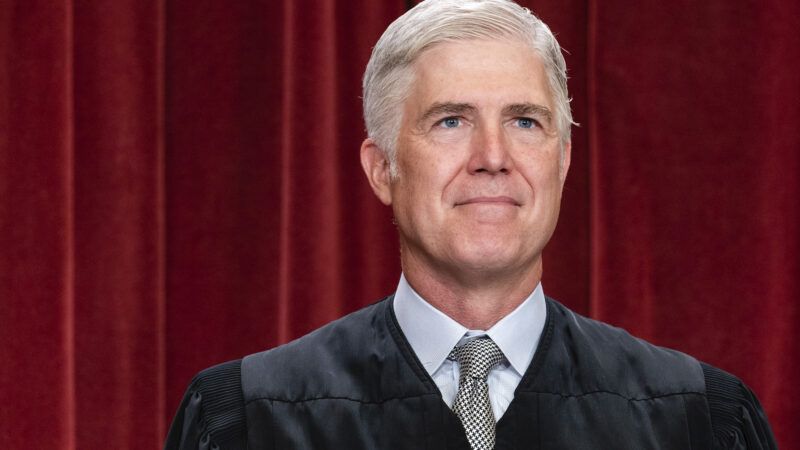Colorado Can't Force a Graphic Designer To Create Same-Sex Wedding Websites, Supreme Court Rules
The decision reverses a terrible previous decision by the 10th Circuit Court of Appeals.

The government may not compel someone to "create speech she does not believe," the Supreme Court ruled this morning. In a 6–3 opinion authored by Justice Neil Gorsuch, the Court sided with a graphic designer, Lorie Smith, who wanted to expand into the wedding-website business without being forced by Colorado law to create products celebrating same-sex marriages.
Back in 2021, the U.S. Court of Appeals for the 10th Circuit found that the planned websites would each constitute "an original, customized creation," designed by Smith "using text, graphics, and in some cases videos" with a goal of celebrating the couple's "unique love story." As such, it said they "qualify as 'pure speech' protected by the First Amendment." The lower court admitted that Smith was willing to provide her services to anyone, regardless of race, religion, or sexual orientation, so long as the substance of the project did not contradict her values. It also recognized that "Colorado's 'very purpose' in seeking to apply its law to Ms. Smith" was to stamp out dissenting ideas about marriage. Despite all of that, incredibly, the 10th Circuit held that the state government was within its authority to compel her to create such websites against her will.
Lamenting "an unfortunate tendency by some to defend First Amendment values only when they find the speaker's message sympathetic," Gorsuch—joined by Chief Justice John Roberts and Justices Clarence Thomas, Brett Kavanaugh, Samuel Alito, and Amy Coney Barrett—concluded otherwise.
The ruling in 303 Creative LLC v. Elenis is neither as narrow nor as broad as it (theoretically) could have been. The Court didn't do away with public accommodations, or businesses prohibited from discriminating against customers on the basis of characteristics such as skin color or national origin. It did note that "no public accommodations law is immune from the demands of the Constitution" and that "public accommodations statutes can sweep too broadly when deployed to compel speech." (The Colorado law was guilty in this instance.)
The high court also didn't establish a right for any and every business owner to decline to provide services for same-sex weddings—only those whose services involve expressive activity. Whether a particular service (say, cake baking) is expressive will have to be litigated case by case.
But the majority did decide Smith's case by appealing to free-expression precedents rather than religious-liberty ones. In other words, the justices didn't say that the faith-based nature of Smith's beliefs about marriage entitled her to an exemption. Presumably, a secular person with moral or factual objections to expressing a particular message would receive all the same protections as a Christian or Muslim objecting on religious grounds. As it should be.
"The opportunity to think for ourselves and to express those thoughts freely is among our most cherished liberties and part of what keeps our Republic strong," Gorsuch wrote in his majority opinion. "Of course, abiding the Constitution's commitment to the freedom of speech means all of us will encounter ideas we consider…'misguided, or even hurtful'….But tolerance, not coercion, is our Nation's answer."


Show Comments (150)